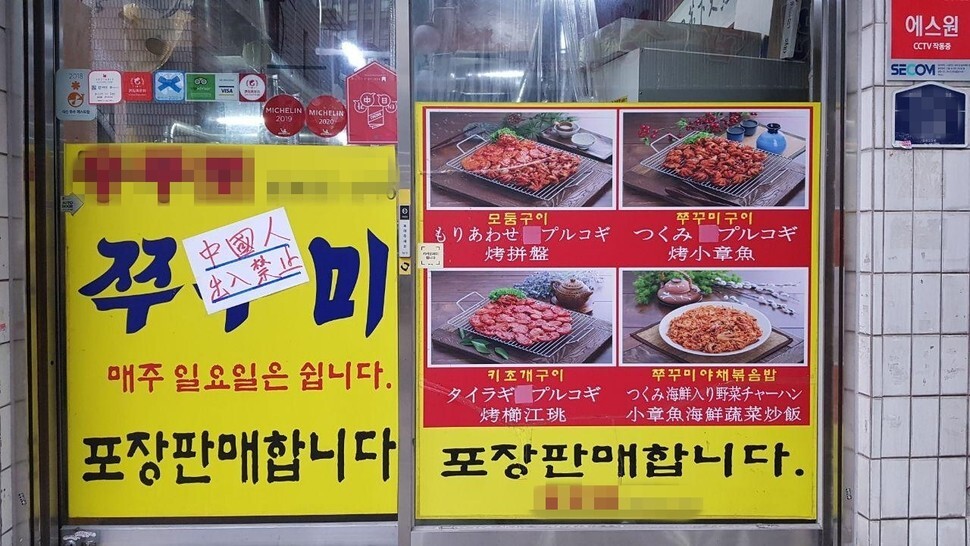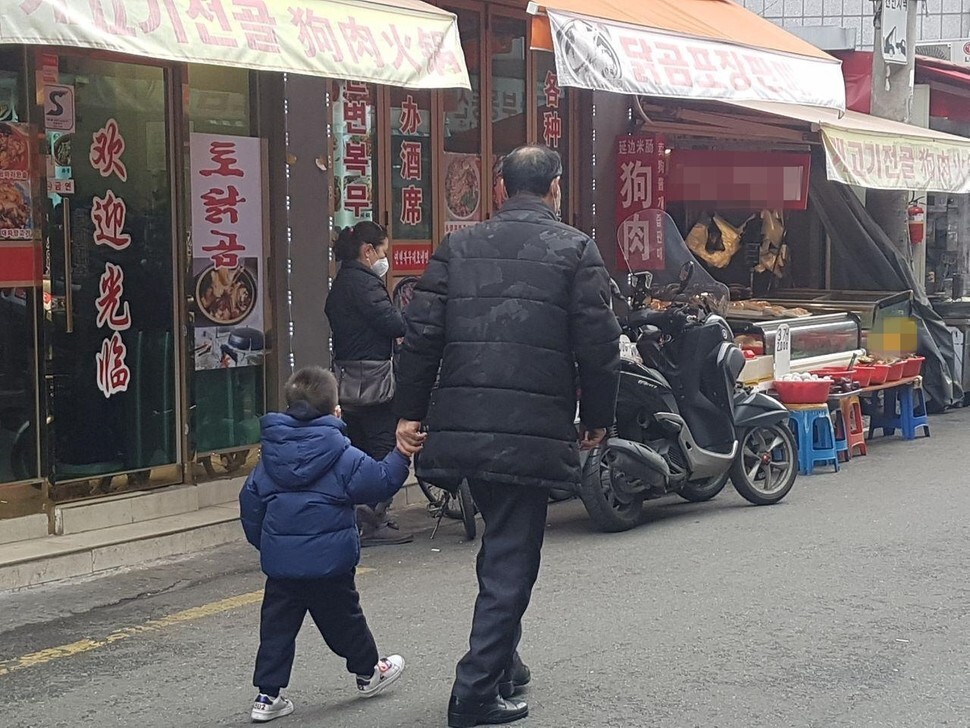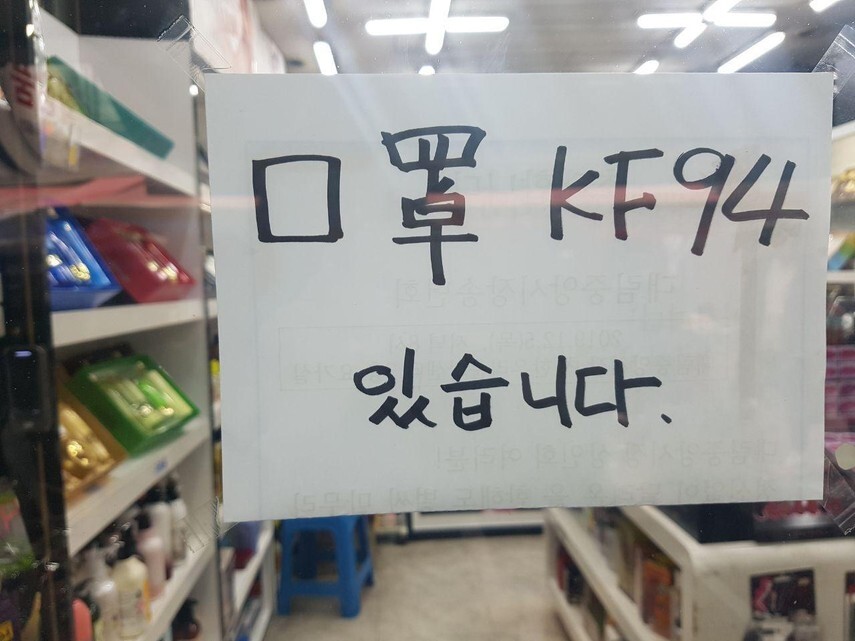hankyoreh
Links to other country sites 다른 나라 사이트 링크
Korean-Chinese face discrimination sparked by coronavirus outbreak

Around noon on Jan. 28, more than half of the people at Daerim Jungang Market — in the Daerim neighborhood of Seoul’s Yeongdeungpo District, where a large population of Korea-Chinese resides — were wearing surgical face masks. A 50-year-old Chinese of Korean descent who has been living there for 12 years told the Hankyoreh about something his family had recently experienced. On Jan. 4, his son was hospitalized after seriously injuring his leg in a traffic accident. But just before the Lunar New Year (which is an extended holiday in South Korea), his son felt compelled to hastily leave the hospital, even though his leg hadn’t completely recovered. One motivation no doubt was the fear of catching the novel coronavirus at the hospital, but he was even more afraid of something else — many Koreans’ disgust for Korean-Chinese.
“We face severe discrimination at the best of times, and it’s pretty obvious that if my son caught something at the hospital, people would start grousing about ‘those Korean-Chinese.’ There were false rumors going around during SARS, and it’s the same now,” the man said with a sigh, referring to the 2013 epidemic of the severe acute respiratory syndrome (SARS).
The fear of Korean-Chinese has spread since the outbreak of the coronavirus in the city of Wuhan, in China’s Hubei Province, sparking hate speech not only online but also in real life. A restaurant in downtown Seoul has put up a sign at the entrance prohibiting Chinese from entering, while a labor union representing food delivery workers asked that they be exempted from making deliveries in areas with a large number of Chinese, though an apology was made later. Internet users are also feeding into hatred and prejudice against Chinese by sharing unverified information.
As of 6 pm on Tuesday, the entrance to a seafood restaurant in downtown Seoul bore a sign that read, in red Chinese characters, “No Chinese allowed.” The restaurant had been a popular choice for Chinese tourists staying in Myeongdong and other locations downtown.
“Obviously, I had the sign put up because of all the talk these days about the coronavirus. I don’t want to serve Chinese customers right now. I have the freedom to accept or reject customers. This is a big deal globally, and it makes me feel icky,” the restaurant owner told the Hankyoreh.
That same day, a labor union of food delivery workers asked to be excused from making deliveries to areas with a large Chinese population (including famous tourist destinations and areas where Chinese typically visit or reside) or at least to be given hazard pay. The request was made by Baemin Riders, a chapter of the Korean Federation of Service Workers’ Unions (affiliated with the Korean Confederation of Trade Unions), in an official document titled “Cooperation Regarding the Wuhan Pneumonia,” referring to the novel coronavirus. The document was sent to Woowa Brothers, the company that operates Baedal Minjok, a popular food delivery application.
This document stirred up controversy and elicited a statement from the Korean Federation of Service Workers’ Unions that evening. “We feel a grave sense of responsibility for the hate speech made by a small number of people in the federation and offer an apology to any individuals who have been hurt,” the federation said.

On Jan. 23, a message was posted on an online community by someone worried about the coronavirus who asked if they should let go of their Korean-Chinese housekeeper. “Our housekeeper didn’t go to China over the holiday, but I’m still worried. We have young kids at our house,” the poster said.
“When Korean-Chinese housekeepers come back to Korea, the first place we’ll see symptoms and panic is in Gangnam [where many of those housekeepers work]. They’re not the kind of people who voluntarily report [their symptoms],” someone else wrote.
“I can’t bring myself to eat out for fear I’ll get hit by spittle from a Korean-Chinese worker,” another said.
This attitude comes as no surprise to Korean-Chinese in the Daerim neighborhood. “It’s upsetting since I hadn’t even thought [of any connection between the coronavirus and Korean-Chinese]. I’d rather not talk about this,” one Korean-Chinese individual said.
“It’s really unfair, but what can we do about it? I always wear a face mask and keep my store clean. If we all stay careful, I hope we can get through this OK,” said a 49-year-old Korean-Chinese individual surnamed Lee who runs a cosmetics shop.

“Korean-Chinese have a similar attitude toward hygiene as we do. People have always felt this kind of disgust for Korean-Chinese, and their feelings are just being aggravated by the coronavirus,” said 49-year-old Kim Yeon-a, general manager of the Daerim Jungang Market Merchants’ Association.
“Everyone who goes to a dangerous region could be infected, whether they’re Korean-Chinese, American or Korean. You’re not going to catch the virus if you come into contact with someone who doesn’t have any symptoms,” pointed out Eom Jung-sik, a professor of infectious diseases at Gachon University Gil Hospital.
By Bae Ji-hyun, Kang Jae-gu, and Seon Dam-eun, staff reporters
Please direct comments or questions to [english@hani.co.kr]

Editorial・opinion
![[Column] Has Korea, too, crossed the Rubicon on China? [Column] Has Korea, too, crossed the Rubicon on China?](https://flexible.img.hani.co.kr/flexible/normal/500/300/imgdb/original/2024/0419/9317135153409185.jpg) [Column] Has Korea, too, crossed the Rubicon on China?
[Column] Has Korea, too, crossed the Rubicon on China?![[Correspondent’s column] In Japan’s alliance with US, echoes of its past alliances with UK [Correspondent’s column] In Japan’s alliance with US, echoes of its past alliances with UK](https://flexible.img.hani.co.kr/flexible/normal/500/300/imgdb/original/2024/0419/2317135166563519.jpg) [Correspondent’s column] In Japan’s alliance with US, echoes of its past alliances with UK
[Correspondent’s column] In Japan’s alliance with US, echoes of its past alliances with UK- [Editorial] Does Yoon think the Korean public is wrong?
- [Editorial] As it bolsters its alliance with US, Japan must be accountable for past
- [Guest essay] Amending the Constitution is Yoon’s key to leaving office in public’s good graces
- [Editorial] 10 years on, lessons of Sewol tragedy must never be forgotten
- [Column] A death blow to Korea’s prosecutor politics
- [Correspondent’s column] The US and the end of Japanese pacifism
- [Guest essay] How Korea turned its trainee doctors into monsters
- [Guest essay] As someone who helped forge Seoul-Moscow ties, their status today troubles me
Most viewed articles
- 1[Column] The clock is ticking for Korea’s first lady
- 2Samsung barricades office as unionized workers strike for better conditions
- 3S. Korea, Japan reaffirm commitment to strengthening trilateral ties with US
- 4[News analysis] After elections, prosecutorial reform will likely make legislative agenda
- 5[Editorial] When the choice is kids or career, Korea will never overcome birth rate woes
- 6Japan officially says compensation of Korean forced laborers isn’t its responsibility
- 7[Editorial] As it bolsters its alliance with US, Japan must be accountable for past
- 8Why Israel isn’t hitting Iran with immediate retaliation
- 9[Column] Has Korea, too, crossed the Rubicon on China?
- 10All eyes on Xiaomi after it pulls off EV that Apple couldn’t